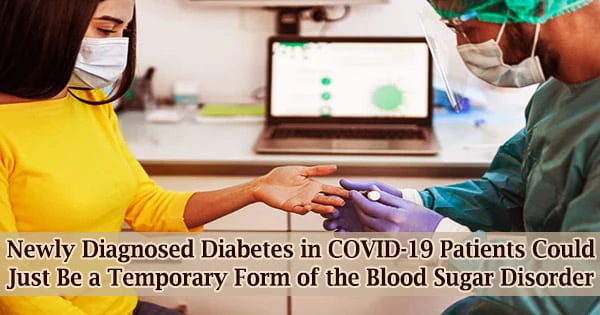According to a study conducted by Massachusetts General Hospital (MGH), many COVID-19 patients newly diagnosed with diabetes during hospital admission may have a temporary form of the disease due to the acute stress of the viral infection and will return to normal blood sugar levels soon after discharge.
According to a study published in the Journal of Diabetes and Its Complications, these patients are more likely to be younger, non-white, and on Medicaid or uninsured than those with previously diagnosed diabetes, suggesting that many of these “new-onset” cases may simply be pre-existing but undiagnosed diabetes in people with limited access to healthcare services.
In COVID-19 hospital admissions around the world, high rates of newly diagnosed diabetic mellitus (NDDM) have been recorded. It’s still unknown whether this is true new diabetes or previously undiscovered cases, what’s causing the elevated blood sugars, and whether patients’ blood sugars improve after the COVID-19 infection is resolved.
Pre-existing diabetes has been linked to an increased risk of hospitalization, ICU admission, mechanical ventilation, and death in persons with COVID-19.
“We believe that the inflammatory stress caused by COVID-19 may be a leading contributor to ‘new-onset’ or newly diagnosed diabetes,” says lead author Sara Cromer, MD, an investigator with the Department of Medicine-Endocrinology, Diabetes, and Metabolism at MGH.
“Instead of directly causing diabetes, COVID-19 may push patients with pre-existing but undiagnosed diabetes to see a physician for the first time, where their blood sugar disorder can be clinically diagnosed. Our study showed these individuals had higher inflammatory markers and more frequently required admission to hospital ICUs than COVID-19 patients with pre-existing diabetes.”
Our results suggest that acute insulin resistance is the major mechanism underlying newly diagnosed diabetes in most patients with COVID-19, and that insulin deficiency if it occurs at all, is generally not permanent. These patients may only need insulin or other medications for a short time, and it’s therefore critical that physicians closely follow them to see if and when their conditions improve.
Sara Cromer
The MGH researchers looked at 594 people who had diabetes mellitus when they were brought to the hospital in the spring of 2020 when the epidemic was at its peak. Prior to admission, 78 of the patients had never been diagnosed with diabetes.
Researchers discovered that many of these newly diagnosed patients had lower blood sugar levels but higher COVID-19 levels than those with pre-existing diabetes. After one year, follow-up with this cohort found that about half of the participants had returned to normal blood sugar levels and just 8% required insulin.
“This suggests to us that newly diagnosed diabetes may be a transitory condition related to the acute stress of COVID-19 infection,” explains Cromer.
Indeed, this key finding supports the clinical argument that newly diagnosed diabetes is more likely caused by insulin resistance, or cells’ inability to properly absorb blood sugar in response to insulin, resulting in a higher-than-normal build-up of glucose in the blood, rather than insulin deficiency, which is caused by direct and permanent injury to the beta cells that manufacture insulin.
“Our results suggest that acute insulin resistance is the major mechanism underlying newly diagnosed diabetes in most patients with COVID-19, and that insulin deficiency if it occurs at all, is generally not permanent,” says Cromer.
“These patients may only need insulin or other medications for a short time, and it’s therefore critical that physicians closely follow them to see if and when their conditions improve.”
Cromer is a Harvard Medical School Medicine instructor (HMS). Deborah Wexler, MD, is a senior author and associate professor of medicine at Harvard Medical School. She is also the assistant clinical leader of the MGH Diabetes Unit and the clinical director of the MGH Diabetes Center.
Melissa Putman, MD, is an assistant professor of pediatrics at Harvard Medical School and an attending physician in endocrinology at Massachusetts General Hospital.





